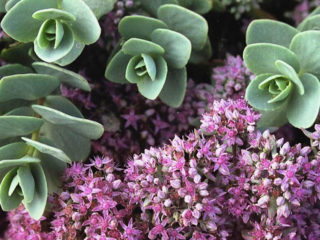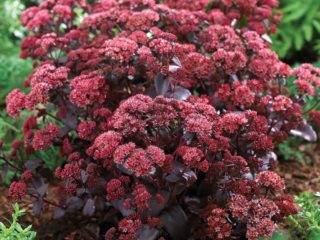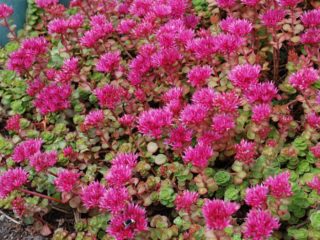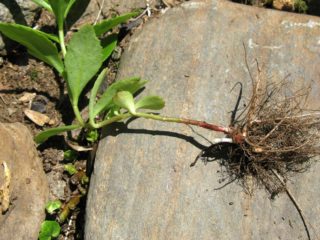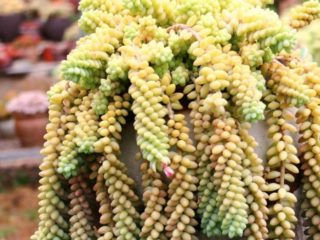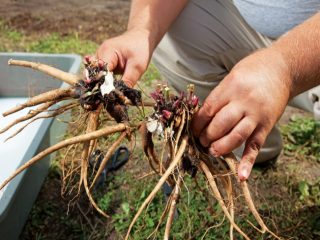Content
Sedum rock (reflexed) is a compact and unpretentious plant that has leaf plates of unusual shape. It is thanks to its unique appearance that it is gaining considerable popularity among gardeners, allowing them to create original compositions in landscape design.
Description of the sedum reflexum
Sedum reflexum, known scientifically as Sedum reflexum, is an evergreen perennial. The plant belongs to the Crassulaceae family and is classified as a succulent, because its main feature is the creation of water reserves in thick leaves and stems.
The sedum root is creeping, so the plant grows horizontally and requires a lot of free space. Over time, the root shoots dry out and harden. As can be seen in the photo of the reflexed sedum, its bushes form a kind of carpet with a height of 15 to 25 cm. The stems are erect, and at the root they spread along the ground.The shoots are dense, up to 15 cm in length, creeping and forming loose clumps. The leaves are fleshy, sessile, linear-needle-shaped. Their color can be green, blue-green, yellow or with a pink tint, depending on the variety.
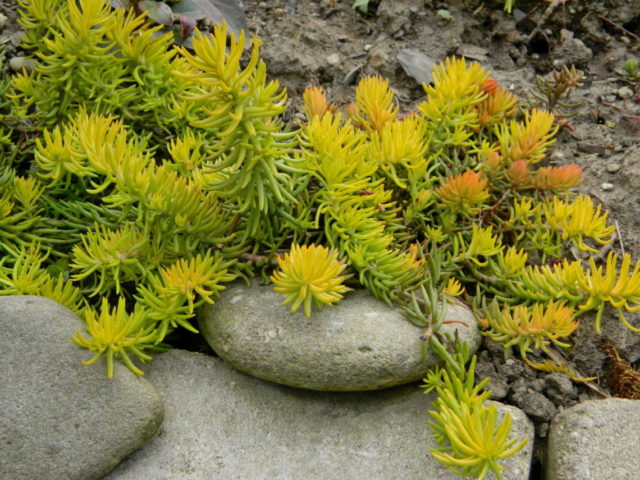
Sedum is a common ground cover plant, against which other garden flowers stand out well.
The flowering period is of medium duration and takes approximately 15-20 days. During this time, umbrella-shaped inflorescences of small, up to 1.5 cm in diameter, bright yellow flowers are formed.
At the end of flowering, yellow fruits appear in the form of an elongated box. The seeds are small, numerous, dusty.
Varieties of rocky sedum
There are many varieties of sedum, which differ from each other in appearance, color, leaf shape, and are even characterized by some nuances during cultivation. Many of them are quite popular among gardeners; they are often used to decorate gardens and personal plots.
Sedum reflexum Christatum
Sedum bent variety Cristatum is considered one of the most bizarre because of its appearance. It seems to bend along the surface relief, for which it received another name: “Cockscomb”.
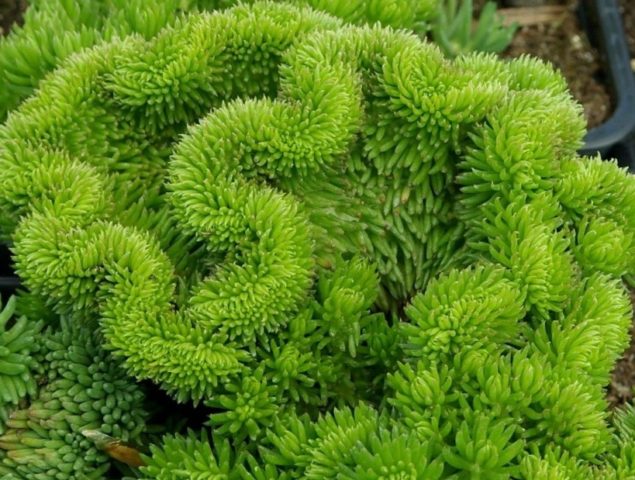
Stonecrop variety Kristatum is used in cooking
Externally, the plant has needle-shaped, fleshy leaves of a rich green color, which become orange-brown in the fall. During the flowering period (from mid-summer) it is covered with yellow inflorescences on high peduncles.
The sedum of this variety grows slowly, but it withstands heat well and is winter-hardy.
Sedum reflexum Blue Forest
Blue Forest is distinguished by its voluminous and very beautiful flowering. The rocky sedum variety itself is low-growing, it does not exceed 20 cm in height.
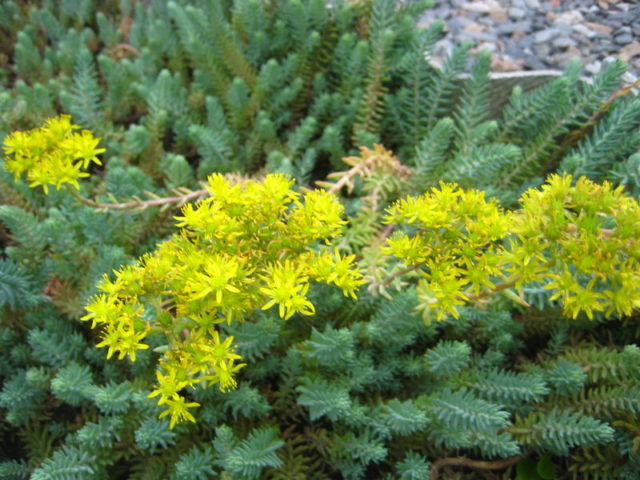
The stems of Blue Forest rock sedum look like the branches of a coniferous tree
This perennial grows densely, covering the entire free surface. The leaves are dense, fleshy, with a slight blue tint, densely and evenly distributed along the stem. The inflorescences have a spherical shape, combining many small yellow flowers.
Sedum rock Angelina
Sedum bent variety Angelina (Angelina) is the fastest growing and spreading over a free surface. He is short, only 15 cm in height.
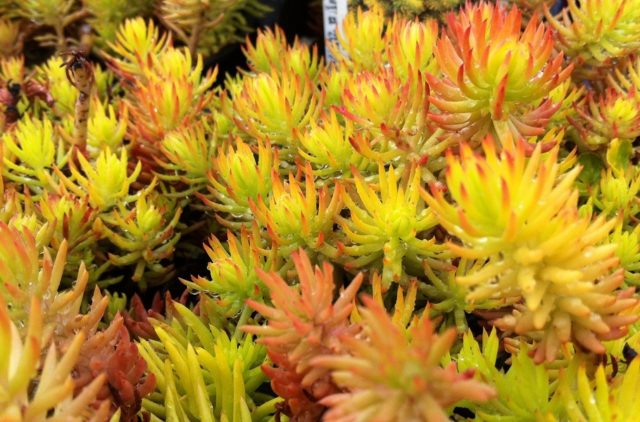
A distinctive feature of Angelina rock sedum is its yellow-orange foliage.
The bush is very lush and stands out brightly against the background of green plants. In autumn the leaves become even more colorful, orange-red. The inflorescences are loose, umbrella-shaped, the flowers are small and yellow.
Sedum Lydian (Glaucum)
The fast-growing evergreen perennial sedum Lydium (Lydium Glaucum) does not require special care. It grows quickly and spreads like a continuous carpet.
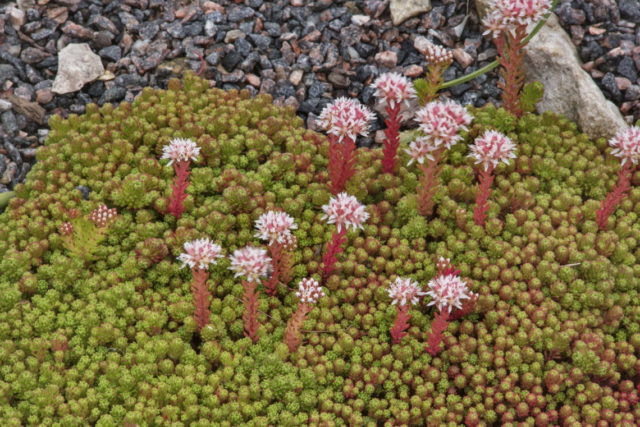
Lydian sedum (Glaucum) can grow in both sunny and shady areas
The bush is voluminous, with numerous small stems rooting at the base. The leaves are succulent, with bluish-blue tops and reddish bottoms.By autumn they completely change their tone to red. It blooms with small white buds, and at the end they turn pinkish.
Sedum Sandy Silver Cross
Sedum rock Sandy Silver Crest is rare because it grows very slowly. Requires little attention, but moderate watering.
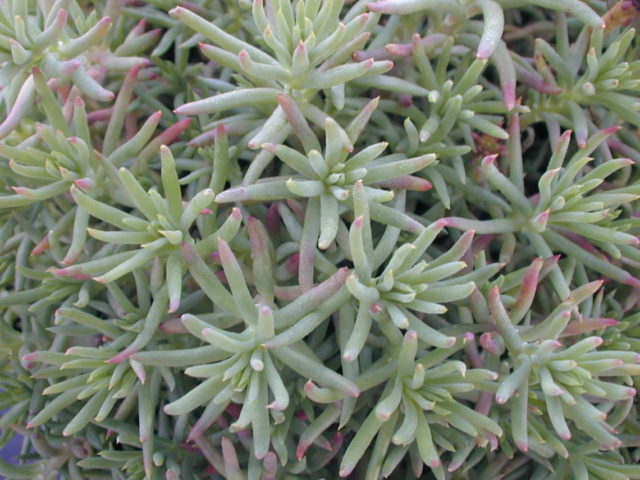
Mostly sedum Sandy Silver Cross is grown in pots on the balcony, stairs, terrace
The bush is lush, characterized by needle-shaped, fleshy leaves of short length. New shoots are lighter in color. And under the bright sun the plant takes on a purple-green hue.
Sedum Sea Gold
Sedum Sea Gold is also a slow-growing variety. The bush is branched and unevenly spreading along the ground.
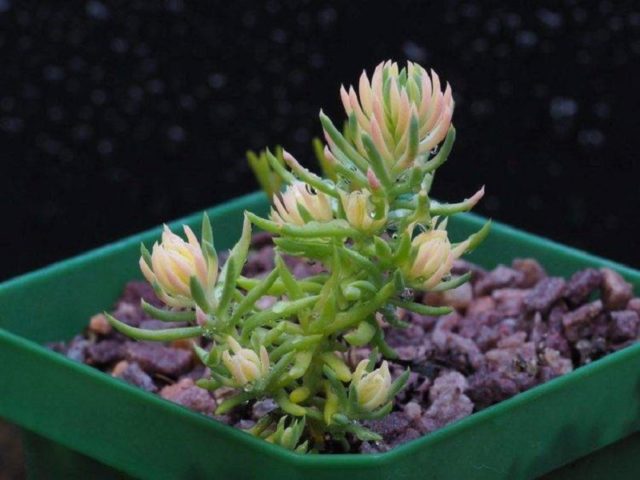
The sedum variety Sea Gold is frost-resistant and can survive the winter without shelter
The bush has elongated leaves of a light green color. In summer, under the influence of the sun, the tops of the stems change their shade to soft lilac.
The plant is unpretentious and easily tolerates partial shade. Most often it is grown in pots.
Planting and caring for sedum
Most varieties of sedum are undemanding in care, so they are often planted in garden plots. The planting itself can be done in different ways: by seed, by dividing the bush or by cuttings.
Selection and preparation of a landing site
The place for planting rock sedum should be chosen taking into account its growth. Therefore, the site should be as free and open as possible. It is also worth focusing on light, since this plant is light-loving; with sufficient lighting, it becomes even more attractive with rich shades.
Sedum has no particular preference for soil, but turfy neutral or slightly acidic soil with good air permeability is best suited for it.
Landing rules
Planting sedum rock can be done by:
- sowing seeds;
- cuttings.
Sow seeds in early spring or autumn in prepared boxes. The plant is planted in open ground, observing the following rules:
- first prepare the soil, dig it up, loosen it and remove weeds;
- arrange a drainage layer, after which the surface is leveled and slightly compacted;
- in the prepared place, holes are formed at a distance of 25-30 cm from each other;
- planting material is placed in the holes, sprinkled with fertile soil mixed with sand and lightly compacted;
- After planting, the area is watered.
Watering and fertilizing
Since sedum is a succulent, this plant does not require frequent watering. Excessive soil moisture can cause various diseases.
In the summer, it is enough to water rock sedum as the soil dries out, 1-2 times in 4 weeks. Infrequent spraying is also allowed to clean the leaves from dust. In winter, watering should be reduced as much as possible to once a month. If the plant grows in open ground, then irrigation is not required in winter.
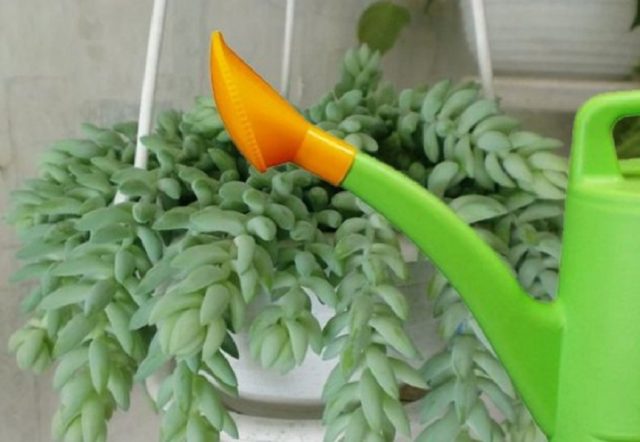
For irrigation, use only clean, soft, warm water
As a rule, increased soil fertility can have a detrimental effect on the appearance of the plant.Under such conditions, rock sedum loses its decorative effect; excess fertilizer especially affects those varieties that have a colored color. In this case, the plant acquires its usual green color.
But you should not neglect feeding, because fertilizers are necessary during the period of active plant growth. To do this, it is best to use mineral complex compositions intended for succulents. And just one feeding per month is enough.
Reproduction of sedum rock
Reproduction of sedum is carried out by seed, cuttings or dividing the bush. As a rule, the first method is very time-consuming and requires a lot of effort. The seedlings grow very fragile and small. In addition, losses of varietal qualities due to cross-pollination are possible.
The most popular method is cuttings, because sedum stems take root quite quickly when they come into contact with the soil. Therefore, not only shoots, but also plant leaves are suitable for propagation.
The selected part of the plant is first dried in fresh air for about 30-40 minutes, and then placed on the surface of the prepared soil. Lightly sprinkle with soil. Water generously.
Propagation by cuttings is carried out from June to September.
Dividing a bush to obtain new specimens of sedum is not used as often as cuttings, but this method is no less effective. In this way, it is recommended to renew the plant every 4-5 years. To do this, carefully dig up an adult bush and divide it into 2-4 parts. Moreover, each should have new shoots and rhizomes.
Diseases and pests
Sedum is a plant with a fairly strong immune system. It is rarely attacked by insects and is resistant to various diseases. But there is still a danger of the plant being damaged by fungal diseases, which spread not only to the roots, but also to the stems and even leaves. This disease can appear due to excessive soil moisture. The spread of rot can only be avoided by digging up the affected bush and destroying it. Specimens that can be saved are treated with a fungicide and their watering is reduced.
Succulent leaves of plants attract some pests, in particular, insects such as aphids, false caterpillars, weevils and sawflies are especially dangerous.
A decoction of hot pepper is used against weevils and false caterpillars. And for serious insect infestations, it is recommended to use insecticides.
Conclusion
Sedum rock is very diverse and unusual in appearance. Regardless of the variety, this plant will be a wonderful decoration for any garden, plot, balcony or terrace. Sedum tolerates drought conditions well, does not require careful care and is easy to propagate, so even a novice gardener can grow it.
